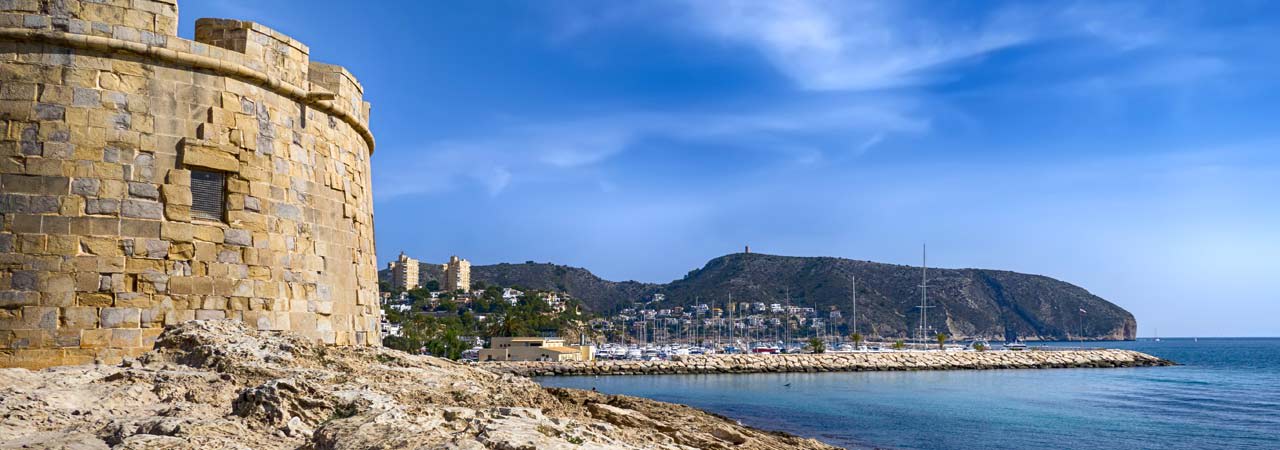Moraira is one of the most beautiful small towns on the Costa Blanca. Given its stunning location, nestled in the foothills of mountains, with crystal-clear, turquoise-blue waters lapping at brilliant white cliffs, it is no wonder that Moraira property is so highly sought-after.
Moraira and the sea
Located 80 km north of Alicante and 108 km south of Valencia, the sea and fishing are very much a way of life in this small coastal town, and boats still go out from the small fishing harbour daily, bringing back impressive hauls for the bustling fish market. In fact, the daily Moraira fish auction is considered to be one of the most important on the Costa Blanca. Much Moraira property is firmly rooted in the town’s fishing village past. Old fishing huts and tackle stores have been gradually extended and converted into houses, resulting in some unique properties.
Moraira boasts no fewer than 8 km of shoreline, with beautiful sheltered beaches and coves, both rocky and sandy. The beach at ‘El Portet’ is particularly delightful, with bars and restaurants along the waterfront. All of the beaches are Blue Flag approved and popular with families and scuba divers alike. For water sports enthusiasts, the privately owned marina is home to the Moraira nautical club. Also in this area are many cafés and restaurants with waterfront views - perfect for relaxing and taking in the atmosphere.
Moraira history
The small town is steeped in history and boasts a restored castle, built in 1742, an old church, a watch tower and a cobbled main square. Moraira’s narrow streets maintain their original character and wind pleasingly through the town, making it a joy to take a walk through them, browse in the shops and stop at cafés. Fiestas throughout the year uphold local traditions and, in July, that of the patron saint of Moraira includes a parade, fireworks and a water procession. Owning a Moraira property could be the key to help you unlock the ‘real Spain’. There are no high-rises here! Local government regulations have controlled development so that the town’s character is preserved. You can rest assured therefore that your view from your Moraira property will not be spoiled.
Moraira is about more than just the traditional and represents a fine mix of the old and modern. Lovers of fine cuisine will relish the many restaurants and bars lining the main square. There is a daily street market selling an array of local produce. Wine, made from Muscatel grapes grown in the 1, 000 hectares of vineyards in the hills above the town, is well worth sampling.
Moraira Property
Some of the most exclusive Moraira property is situated in the beautiful pine-forested area of the Moraira foothills. Many of these properties enjoy a south-facing aspect with views to the sea below. The villas here are typically Spanish in style, but the area is purposefully not over-developed. Owners of property in this area have space to enjoy the tranquillity of this beautiful place. Even the pine trees are protected.
Moraira enjoys over 300 days of sunshine per year and an average annual temperature of 18 °C. This mild climate means that it is pleasant at any time of year. In summer the temperature reaches up to 38°C and only on the coldest of winter days does it drop to 6°C. Moraira’s location in the foothills not only gives perfect shelter from colder northerly winter winds but also provides a natural vortex for cooling sea breezes in summer.
Transport links to Moraira
Moraira is linked to the nearby town of Teulada by road, and it is from there that you can find rail and bus services to places further afield, including Alicante and Valencia. It is easy to get out and explore the Costa Blanca region by car.
If you are looking for a Costa Blanca property with traditional Spanish charm in a wonderful location, then an exclusive Moraira property is waiting for you!
1. Putting down a Holding Deposit
On finding a property you wish to purchase you will need to negotiate the terms, price and conditions of the sale with the owner. This part of the process is not binding. We would recommend using an independent English speaking legal advisor. Once a purchase price has been agreed, normally a holding or reserve deposit will be required to ensure the property is removed from the market. The sum required will vary between properties and will be based on the purchase price. A time limit for the preagreement to be signed will be arranged and there will also be legal checks to be made.
2. Setting up a Pre-agreement (Contrato privado de compraventa)
The pre-agreement will set out the conditions under which the Buyer and Seller agree to complete the purchase of the property and the price they have agreed upon. Relevant details will generally be included for example the property details, purchase price and the date for completion. A deposit will be required at this point, this will vary, but will generally be 10% of the agreed price. This agreement will include a penal clause if the sale does not go through. If the seller pulls out of the sale your compensation will be double the deposit you have paid, but if you decide not to go through with the sale then your deposit will be lost. Certain checks will need to be made before signing the contract, checks should be made against the title of the property, mortgage status and if the property has any debts held against it. The planning status should also be looked into. These conditions can be varied by the seller and the buyer and other types of agreement can be made.
3. The Contract (Escritura de compraventa)
Before a non-Spanish purchaser can buy a Spanish property they will need to have set up a Spanish bank account and obtained a Spanish tax number (NIE). The completion will take place in the presence of a Notary Public. This is a Spanish public official, by law the deed of sale must be witnessed by a Notary Public. You will also need your own independent, expert legal advisor to act on your behalf. On Completion the buyer must pay the balance, that is the price agreed after the deposit has been deducted, plus any other fees on the completion date. Both buyer and seller must sign the Escritura de compraventa contract, (this is the Spanish equivalent of the title deeds). The title deeds (escritura) will be given to the buyer, this will be done in the presence of a Notary Public, they will certify that the transfer has taken place. The tax office will be sent a copy and the property registry will be informed of the transfer.
IMPORTANT - Disclaimer :
All information provided is believed to be current and provided free of charge. No liability can be accepted for the reliability of the information and statements made as this is obtained from 3rd parties. We always recommend you take legal advice from a fully qualified Lawyer or Notary before buying a property overseas.
Close





 Facebook
Facebook Twitter
Twitter Instagram
Instagram